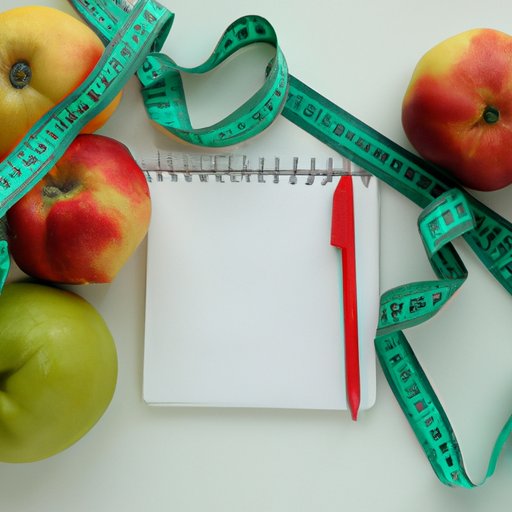
Introduction
If you’re looking to shed some unwanted pounds, you’re not alone. Losing weight is a common goal for many people. However, figuring out the right foods to eat can be a tough challenge. This article is here to help you get on the right track. We’ll discuss the top foods to include in your diet, as well as some foods that should be avoided. We’ll also provide some healthy meal plans, time-saving tips, and information on foods that can boost your metabolism to help you reach your weight loss goals.
The Best Foods to Include in Your Weight Loss Diet
One of the most important things you can do when trying to lose weight is to incorporate low-calorie, nutrient-dense foods into your diet. Here are some foods that should definitely make it onto your grocery list:
- Fruits and vegetables: these are low in calories and high in fiber, which can keep you feeling full for longer periods of time.
- Lean proteins: chicken, fish, tofu, and legumes are excellent sources of protein, which can also help keep you feeling full and satisfied.
- Whole grains: these are a great source of complex carbohydrates, which can help give you sustained energy throughout the day.
- Nuts and seeds: these are packed with healthy fats and protein, which can keep you feeling satisfied and full.
Including these foods in your diet can not only help with weight loss, but can also boost your overall health and well-being.
Foods to Avoid for Weight Loss
While it’s important to focus on the foods that are good for you, it’s also important to avoid foods that can hinder your weight loss efforts. Here are some foods to steer clear of:
- Processed foods: these are often high in calories and sugar, and can contribute to weight gain.
- Sugar: sugary drinks and foods can cause spikes in blood sugar levels and lead to weight gain.
- High-fat foods: while some sources of fat are healthy, such as those found in nuts and avocado, foods high in saturated and trans fats can contribute to weight gain and other health issues.
Avoiding these foods can help you stay on track with your weight loss goals and improve your overall health.
Healthy Meal Plans for Weight Loss
Planning your meals ahead of time can be a great way to stay on track with your weight loss goals. Here are some ideas for healthy meal plans:
Breakfast:
- Egg white omelet with spinach and mushrooms
- Greek yogurt with fruit and nuts
- Oatmeal with berries and almond milk
Snacks:
- Carrots and hummus
- Apple slices with peanut butter
- Nuts and seeds
Lunch:
- Grilled chicken with vegetables
- Tuna salad with mixed greens
- Vegetable stir-fry with tofu
Dinner:
- Baked salmon with quinoa and roasted vegetables
- Whole wheat pasta with marinara sauce and vegetables
- Lentil soup with a side salad
Dessert:
- Fresh fruit salad
- Dark chocolate squares
- Baked apples with cinnamon
These meals are all low in calories, high in nutrients, and easy to prepare. Plus, they’re delicious!
Tips for Losing Weight with a Busy Schedule
Eating healthy can be a challenge when you’re short on time, but it’s still possible. Here are some time-saving tips to help you maintain a healthy, weight-loss friendly diet:
- Prep your meals in advance: spend a few hours on the weekend prepping your meals for the week ahead.
- Keep healthy snacks on hand: always keep some nuts, seeds, or cut-up veggies in your bag or desk drawer for a quick snack.
- Invest in a slow cooker: slow cooker meals can be prepped in advance and left to cook while you’re at work or running errands.
By following these tips, you can stay on track with your weight loss goals even when you’re short on time.
Foods that Can Boost Your Metabolism
Boosting your metabolism can help you burn more calories throughout the day, even when you’re not exercising. Here are some foods that have been shown to boost metabolism:
- Green tea: contains antioxidants and caffeine, which can help boost metabolism and burn fat.
- Spicy foods: capsaicin, the compound that gives chili peppers their heat, can help boost metabolism and burn calories.
- Protein: the body burns more calories digesting protein than it does digesting carbohydrates or fats.
By incorporating these foods into your diet, you can help boost your metabolism and burn more calories.
Conclusion
Losing weight can be tough, but it’s possible with the right diet and lifestyle changes. By incorporating low-calorie, nutrient-dense foods into your diet, avoiding foods that hinder weight loss, and following the healthy meal plans and time-saving tips provided in this article, you’ll be well on your way to reaching your weight loss goals. Remember, small changes over time can lead to big results, so don’t get discouraged if progress is slow.





